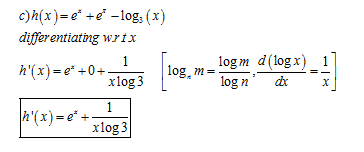Calculus: Early Transcendentals
8th Edition
ISBN:9781285741550
Author:James Stewart
Publisher:James Stewart
Chapter1: Functions And Models
Section: Chapter Questions
Problem 1RCC: (a) What is a function? What are its domain and range? (b) What is the graph of a function? (c) How...
Related questions
Question
![### Calculus: Determining the First Derivative
To enhance your understanding of calculus, practice using any derivative rule to determine the first derivative of the following functions. Simplification of the result is not necessary.
#### Problem 1:
\[ h(x) = e^{-x} + e^{\pi} - \log_3(x) \]
#### Problem 2:
\[ p(x) = x \sin(x) \]
**Instructions:**
1. Identify and apply the appropriate derivative rules to each function.
2. Recall that the derivative of \(e^u\) where \(u\) is a function of \(x\) is \(e^u \cdot u'\).
3. For logarithms, the derivative of \(\log_b(x)\) is \(\frac{1}{x \ln(b)}\).
4. Utilize the product rule for derivatives when necessary, specifically for functions where products of two functions are involved. The product rule states: \((uv)' = u'v + uv'\).
Explaining in detail:
- For \( c) \), apply the chain rule and the knowledge of basic derivative formulas for exponential and logarithmic functions.
- For \( d) \), recognize that this function requires the use of the product rule since it is the product of \( x \) and \(\sin(x)\). Apply the product rule accordingly.
By working through these exercises, you will gain a deeper understanding and become more proficient at differentiating a variety of functions.](/v2/_next/image?url=https%3A%2F%2Fcontent.bartleby.com%2Fqna-images%2Fquestion%2F6ce675ac-583d-450e-8ae1-ad1f22609723%2Fccb6fdec-1818-4e1c-baa7-d4fb2193196b%2F944fytn_reoriented.jpeg&w=3840&q=75)
Transcribed Image Text:### Calculus: Determining the First Derivative
To enhance your understanding of calculus, practice using any derivative rule to determine the first derivative of the following functions. Simplification of the result is not necessary.
#### Problem 1:
\[ h(x) = e^{-x} + e^{\pi} - \log_3(x) \]
#### Problem 2:
\[ p(x) = x \sin(x) \]
**Instructions:**
1. Identify and apply the appropriate derivative rules to each function.
2. Recall that the derivative of \(e^u\) where \(u\) is a function of \(x\) is \(e^u \cdot u'\).
3. For logarithms, the derivative of \(\log_b(x)\) is \(\frac{1}{x \ln(b)}\).
4. Utilize the product rule for derivatives when necessary, specifically for functions where products of two functions are involved. The product rule states: \((uv)' = u'v + uv'\).
Explaining in detail:
- For \( c) \), apply the chain rule and the knowledge of basic derivative formulas for exponential and logarithmic functions.
- For \( d) \), recognize that this function requires the use of the product rule since it is the product of \( x \) and \(\sin(x)\). Apply the product rule accordingly.
By working through these exercises, you will gain a deeper understanding and become more proficient at differentiating a variety of functions.
Expert Solution
Step 1

Step 2

Trending now
This is a popular solution!
Step by step
Solved in 3 steps with 3 images

Knowledge Booster
Learn more about
Need a deep-dive on the concept behind this application? Look no further. Learn more about this topic, calculus and related others by exploring similar questions and additional content below.Recommended textbooks for you

Calculus: Early Transcendentals
Calculus
ISBN:
9781285741550
Author:
James Stewart
Publisher:
Cengage Learning

Thomas' Calculus (14th Edition)
Calculus
ISBN:
9780134438986
Author:
Joel R. Hass, Christopher E. Heil, Maurice D. Weir
Publisher:
PEARSON

Calculus: Early Transcendentals (3rd Edition)
Calculus
ISBN:
9780134763644
Author:
William L. Briggs, Lyle Cochran, Bernard Gillett, Eric Schulz
Publisher:
PEARSON

Calculus: Early Transcendentals
Calculus
ISBN:
9781285741550
Author:
James Stewart
Publisher:
Cengage Learning

Thomas' Calculus (14th Edition)
Calculus
ISBN:
9780134438986
Author:
Joel R. Hass, Christopher E. Heil, Maurice D. Weir
Publisher:
PEARSON

Calculus: Early Transcendentals (3rd Edition)
Calculus
ISBN:
9780134763644
Author:
William L. Briggs, Lyle Cochran, Bernard Gillett, Eric Schulz
Publisher:
PEARSON

Calculus: Early Transcendentals
Calculus
ISBN:
9781319050740
Author:
Jon Rogawski, Colin Adams, Robert Franzosa
Publisher:
W. H. Freeman


Calculus: Early Transcendental Functions
Calculus
ISBN:
9781337552516
Author:
Ron Larson, Bruce H. Edwards
Publisher:
Cengage Learning